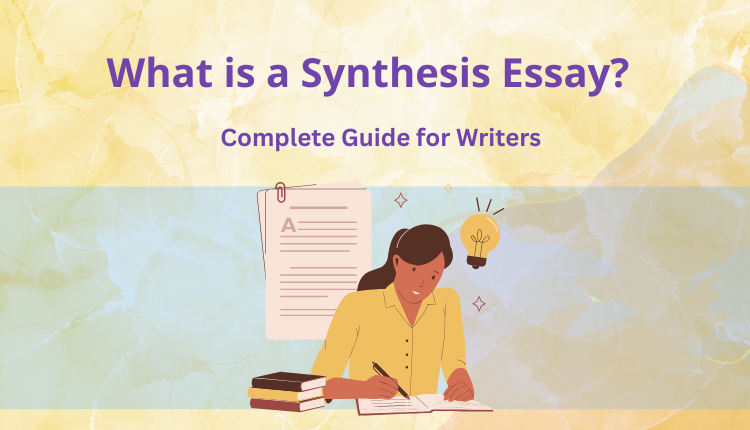Writing a synthesis essay is both intellectually rewarding and engaging. A synthesis essay involves the integration of multiple ideas, viewpoints, and sources into one unified argument. For students, researchers, and professionals, this type of essay provides a valuable opportunity to demonstrate analytical thinking, critical reasoning, and mastery of blending diverse inputs cohesively. In this comprehensive guide, we’ll explore what a synthesis essay is, its key purpose, the types of synthesis essays, and actionable steps to make your synthesis essay compelling.
Why Mastering Synthesis Essays Is Essential
A synthesis essay is far more than just summarizing information. It’s about analyzing different perspectives to form a structured, persuasive, and well-rounded argument. Whether in academia, business, or professional writing, synthesis essays are beneficial for:
- Academics: Reviewing different works of literature or conducting detailed analyses.
- Journalism: Balancing multiple viewpoints in the presentation of news.
- Businesses/Marketing: Synthesizing diverse market trends into actionable strategies.
By honing this skill, you not only improve your critical and analytical reasoning, but you also refine your ability to communicate sophisticated ideas with clarity and cohesion.
What Exactly is a Synthesis Essay?
A synthesis essay weaves together information from various sources—books, research papers, articles, or industry reports—to form a cohesive argument around a central theme. Unlike traditional essays, a synthesis essay merges perspectives to uncover new insights rather than simply summarizing them.
Think of it like composing a symphony: multiple sources come together as distinct elements, blending harmoniously under one central thesis.
Key goals of a synthesis essay:
- Display a clear understanding of source material.
- Establish logical flow and interconnections between sources.
- Build a cohesive argument using comparative reasoning and evidence.
Typically, synthesis essays are assigned in advanced academic settings, like AP English exams or college classes where students merge insights from their research to build new arguments.
The Purpose of a Synthesis Essay
Creating a synthesis essay goes beyond mere summarization in three critical ways:
1. Identifying Gaps:
Analyze differences in viewpoints and discover the underlying implications.
2. Promoting New Insight:
Merge insights from your sources into an original argument or solution.
3. Balanced Argumentation:
Instead of favoring one source, present arguments fairly with data-driven evidence.
A well-crafted synthesis essay doesn’t just present information—it offers depth, paving the way for new interpretations and analysis.
Types of Synthesis Essays: Which One Should You Write?
1. Explanatory Synthesis
Purpose: To clarify a central idea, issue, or concept using evidence from multiple sources. This format is not argumentative; it focuses on understanding key topics.
Example: A chapter in a textbook that integrates data from several studies to explain one concept.
2. Argumentative Synthesis
Purpose: To express and defend a specific position while incorporating evidence from multiple sources. Argumentative synthesis essays are often utilized to discuss contentious issues or academic debates.
Example: A research paper advocating for renewable energy supported by contrasting views.
3. Literature Review
Purpose: Common in academic settings, a literature review compiles and synthesizes scholarly work to identify trends, gaps, or contradictions in a specific research field.
Example: Highlighting emerging technologies’ role in climate action while identifying areas needing further study.
| Aspect | Explanatory Synthesis | Argumentative Synthesis |
|---|---|---|
| Purpose | To clarify | To persuade an audience and argue a viewpoint |
| Use of Sources | Neutral presentation | Use sources that build and validate arguments |
| Application Examples | Textbook excerpts | Editorials, debates, or thesis presentation |
How to Write a Synthesis Essay: Step-By-Step Guide
Writing a synthesis essay requires careful planning and execution. Follow these steps for success:
Step 1: Understand the Prompt
Identify whether your essay will explain, argue, or review. This clarity shapes your objective and outlines the roadmap for your essay.
Step 2: Research and Collect Relevant Sources
Gather relevant, credible, and diverse materials for a strong foundation. Books, peer-reviewed studies, and reputable websites provide balanced perspectives.
Step 3: Create a Centralized Thesis
Integrate ideas from multiple sources into one cohesive thesis. Your thesis sets the tone and direction for the essay while introducing your perspective.
Step 4: Organize and Compare Information
Arrange findings categorically. Highlight recurring trends or conflicts. Use note cards, concept maps, or a matrix to deepen your argument understanding.
Step 5: Outline the Structure
- Introduction: Provide a captivating intro, state your goal, and include the thesis.
- Main Body Paragraphs: Discuss key dimensions or arguments, citing supporting evidence.
- Conclusion: Sum up the arguments, linking insights from the sources to your primary thesis.
Step 6: Use Proper Citation Methods
For academic rigor, adhere to citation guidelines such as APA, MLA, or AMA. Tools like Trinka simplify citation accuracy and traceability.
Common Challenges in Synthesis Essay Writing
- Confusing Summary with Synthesis
Avoid summarizing individual sources; instead, connect the information meaningfully. - Unclear Argumentation
Ensure your arguments naturally flow from the thesis and are backed by strong evidence. - Inconsistent Writing Tone
Keep the essay professional and cohesive. Tools like Trinka AI grammar checker can ensure stylistic consistency and smooth transitions.
Enhance Your Synthesis Writing with Trinka
Exploring AI tools like Trinka can significantly enhance synthesis essay writing for professionals and students alike. What makes Trinka unique?
- Offers AI-powered analysis to ensure rhetorical coherence.
- Provides suggestions for clearer, impactful arguments.
- Identifies potential style or citation mismatches.
- Checks grammar, evidence-based reasoning flow, and reduces redundancy.
By incorporating Trinka’s capabilities, synthesis essay writing becomes streamlined, accurate, and polished for any academic or professional purpose.
Improve Your Writing Journey
Mastering synthesis essays is a critical academic and professional skill. It showcases your ability to harmonize information while fostering critical thinking and analytical reasoning. Utilize practical steps and tools like Trinka Grammar Checker to elevate your essay-writing proficiency—even on a tight timeline.
Whether explaining intricate concepts or advocating for pressing issues, synthesis essay writing is a pathway for meaningful intellectual exploration. Let Trinka assist you in refining your craft, blending AI-driven insights with your perspectives. Start your journey to impactful essay creation today!

